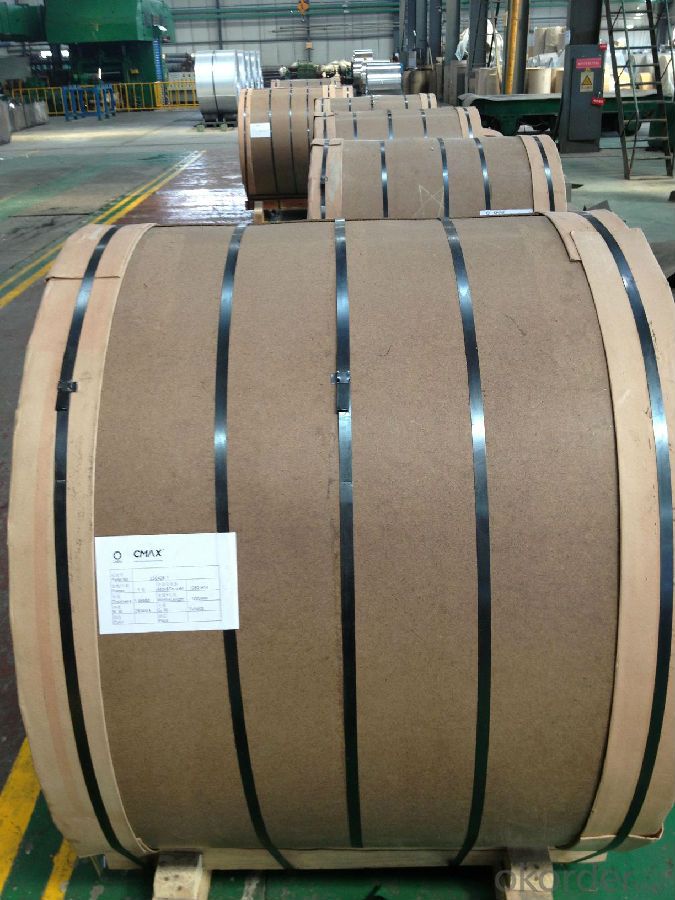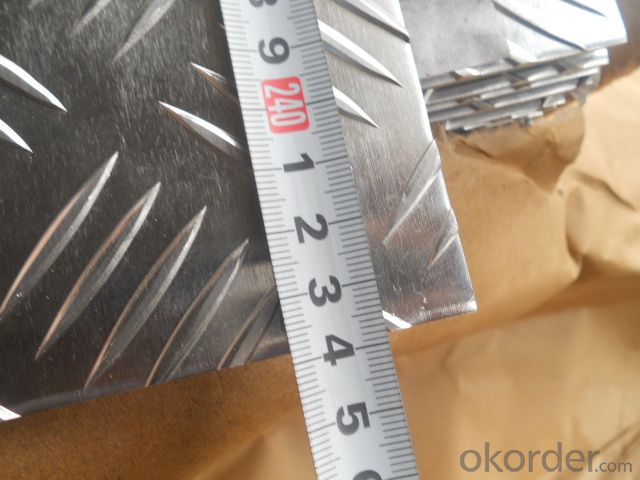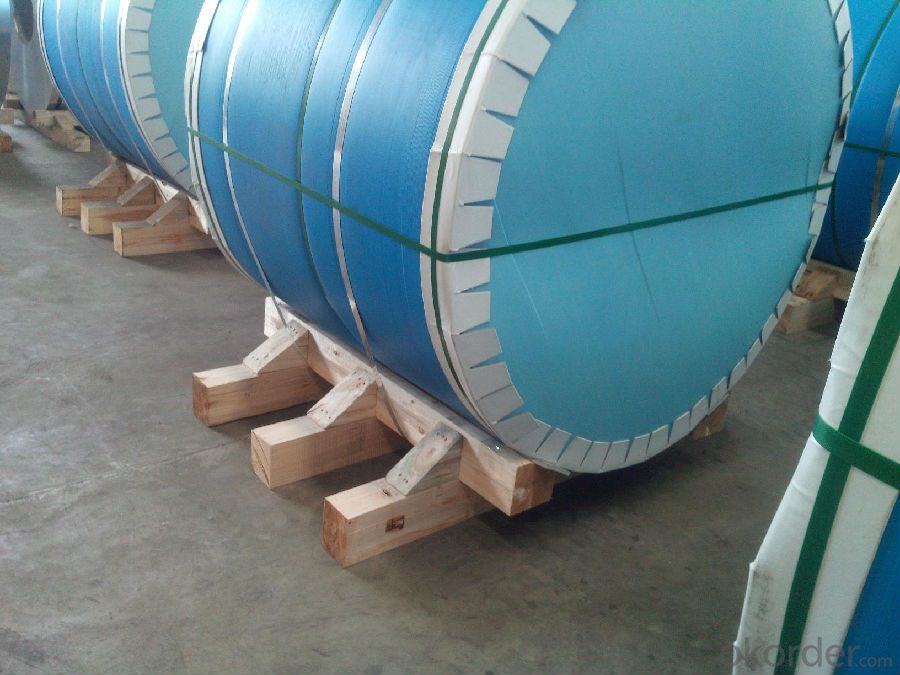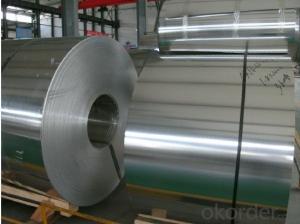Mill Finished Aluminum Coils for Secondly Pass
- Loading Port:
- Shanghai
- Payment Terms:
- TT OR LC
- Min Order Qty:
- 5 m.t.
- Supply Capability:
- 1000000 m.t./month
OKorder Service Pledge
OKorder Financial Service
You Might Also Like
Item specifice
1.Structure of Mill Finished Aluminum Coils for Secondly Pass
Mill Finished Aluminum Coils for Secondly Pass is one semi-finished aluminium material. This strip can be rolled down to aluminium coil,sheet,circle ect. The alloy AA1050 is widly used in building, industry ect. Its weight is much lower than steel. So many customers choosed aluminium material instead of steel.
2. Main features of Mill Finished Aluminum Coils for Secondly Pass
a.Competitive price---We have our own mills and can produce mill finished aluminium coils, so we can control the production cost better.
b.Professional after-sale service---We have more than 15 years exportation experience and you need not worry about the exporation problems.
c.Fast delivery time---We can control the delivery time within 35 days.
3. Image of Mill Finished Aluminum Coils for Secondly Pass



4. Product Specification
| ALLOY | TEMPER | ROLLING | THICKNESS | WIDTH |
| AA1050 | H14 | CONTINUOUS ROLLING | 3MM-5MM | 1000MM-1500MM |
5.FAQ:
What is the quality standard?
---Usually our standard is GB3880-2006
What is the largest width?
---It is 2300mm
What is the MOQ?
---Usually we can accept 80 tons.
- Q:Can aluminum coils be used in extreme weather conditions?
- Aluminum coils are capable of being utilized in the harshest weather conditions. With its exceptional durability and resistance to corrosion, aluminum proves to be a formidable material that can endure extreme heat, cold, humidity, as well as heavy rain or snow. Notably, it finds extensive employment in essential areas where weather resistance holds paramount importance, including air conditioning systems, refrigeration units, and outdoor equipment. These coils are expressly engineered to possess remarkable strength and dependability, ensuring their suitability for deployment in severe weather conditions, all the while maintaining optimal performance and lasting durability.
- Q:Can aluminum coils be used for roofing applications?
- Yes, aluminum coils can be used for roofing applications. Aluminum is a popular choice for roofing due to its lightweight nature, durability, and resistance to corrosion. It is commonly used for both residential and commercial roofing projects.
- Q:high-quality hi-fi power and amplifiers generate large amounts of heat. to dissipate the heat and prevent damage to the electronic components, heat-radiating metal fins are used. would it be better to make these fins out of iron or aluminum? specific heat capacities for aluminum and iron are 0.89 J/degrees C.g and 0.45 J/degrees C.g, respectively. explain your answer
- Aluminum has high specific heat than iron which means more energy is require to change aluminum temperature than it of iron. A good conductor is a good emmiter so aluminum will be a best choice since it will not heat up as much as iron for the same amount of mass and energy imput.
- Q:How are aluminum coils used in the production of battery enclosures?
- Aluminum coils are widely used in the production of battery enclosures due to their excellent properties. Firstly, aluminum is a lightweight material, making it ideal for creating lightweight battery enclosures, which is crucial for portable devices and electric vehicles where weight reduction is important. Additionally, aluminum coils can be easily formed into different shapes and sizes, allowing manufacturers to customize the battery enclosures to fit specific battery designs. This flexibility in shaping also helps to optimize space utilization and improve the overall efficiency of the battery system. Moreover, aluminum is highly resistant to corrosion, which is essential for battery enclosures as they are often exposed to harsh environments and chemicals. This corrosion resistance ensures the longevity and reliability of the battery enclosure, protecting the battery cells from damage and ensuring safe operation. Furthermore, aluminum has excellent thermal conductivity, allowing it to efficiently dissipate heat generated during the battery charging and discharging process. This is vital for preventing overheating and maintaining the optimal temperature range for battery performance. In conclusion, aluminum coils play a crucial role in the production of battery enclosures by providing lightweight, customizable, corrosion-resistant, and thermally conductive properties. These properties contribute to the overall efficiency, safety, and longevity of battery systems used in various applications such as consumer electronics, electric vehicles, and renewable energy storage.
- Q:Can aluminum coils be used for electrical enclosures?
- Yes, aluminum coils can be used for electrical enclosures. Aluminum is a lightweight and durable material that provides excellent electrical conductivity and heat dissipation properties. It also has good corrosion resistance, which makes it suitable for various environmental conditions. Aluminum coils can be easily formed into different shapes and sizes, making them versatile for enclosure designs. Additionally, aluminum is a cost-effective option compared to other metals like stainless steel. However, it is important to ensure proper insulation and grounding when using aluminum coils for electrical enclosures to prevent any electrical hazards.
- Q:Are there any limitations to the maximum coil length of aluminum coils?
- Yes, there are limitations to the maximum coil length of aluminum coils. The length of aluminum coils is typically restricted by factors such as the capabilities of manufacturing equipment, transportation constraints, and handling limitations. Additionally, longer coils are more prone to issues like coil sagging and deformation during storage or handling. Therefore, there is a practical limit to the maximum coil length that can be produced and effectively utilized in various industries.
- Q:why is aluminum to the right side of the periodic table if it's a metal and why is it negatively charge if it's a mental. also if you combine it with like another metal will it be an ion since its positively charge or no because they are both metals
- It okorder /
- Q:Are aluminum coils suitable for automotive body panels?
- Yes, aluminum coils are suitable for automotive body panels. Aluminum is lightweight, which helps improve fuel efficiency and overall vehicle performance. Additionally, aluminum is highly corrosion-resistant, making it an ideal choice for automotive applications where the panels are exposed to various weather conditions. Its high strength-to-weight ratio also provides excellent durability and crash resistance. Moreover, aluminum can be easily formed and shaped, allowing for intricate and stylish designs. Overall, the use of aluminum coils for automotive body panels offers numerous advantages and is a popular choice among car manufacturers.
- Q:What are the common coil inner diameters for aluminum coils?
- The common coil inner diameters for aluminum coils can vary depending on the specific application and industry requirements. However, some commonly used inner diameters for aluminum coils are 150 mm (5.9 inches), 200 mm (7.9 inches), and 300 mm (11.8 inches). These inner diameters are often chosen based on factors such as the coil's size, weight, ease of handling, and compatibility with manufacturing equipment. It is important to note that these are just a few examples, and the actual inner diameters may vary depending on the specific needs of each industry or application.
- Q:What are the common surface preparation methods for aluminum coils?
- Common surface preparation methods for aluminum coils include cleaning, degreasing, and etching. Cleaning is typically the first step in the surface preparation process for aluminum coils. This involves removing any dirt, dust, or other contaminants from the surface. Cleaning can be done using a variety of methods, such as using solvents, alkaline cleaners, or mechanical cleaning techniques like brushing or scrubbing. Degreasing is another important step in preparing aluminum coils. This helps to remove any oils or greases that may be present on the surface. Degreasing can be done using solvents or alkaline cleaners specifically designed for this purpose. It is essential to thoroughly remove any grease or oils, as they can interfere with subsequent treatments and coatings. Etching is often performed on aluminum coils to create a roughened surface, which improves adhesion for subsequent coatings or treatments. Etching can be done using chemical etchants or through mechanical methods such as sandblasting. The choice of etching method depends on the specific requirements of the application and the desired surface finish. After surface preparation, additional treatments may be applied to aluminum coils, such as conversion coatings or anodizing, to enhance corrosion resistance or improve surface properties. These treatments help to protect the aluminum surface and provide a base for further finishes or coatings. Overall, proper surface preparation is crucial for achieving good adhesion, corrosion resistance, and overall performance of aluminum coils in various applications. It ensures that the surface is clean, free from contaminants, and properly prepared for subsequent treatments or coatings.
1. Manufacturer Overview |
|
|---|---|
| Location | |
| Year Established | |
| Annual Output Value | |
| Main Markets | |
| Company Certifications | |
2. Manufacturer Certificates |
|
|---|---|
| a) Certification Name | |
| Range | |
| Reference | |
| Validity Period | |
3. Manufacturer Capability |
|
|---|---|
| a)Trade Capacity | |
| Nearest Port | |
| Export Percentage | |
| No.of Employees in Trade Department | |
| Language Spoken: | |
| b)Factory Information | |
| Factory Size: | |
| No. of Production Lines | |
| Contract Manufacturing | |
| Product Price Range | |
Send your message to us
Mill Finished Aluminum Coils for Secondly Pass
- Loading Port:
- Shanghai
- Payment Terms:
- TT OR LC
- Min Order Qty:
- 5 m.t.
- Supply Capability:
- 1000000 m.t./month
OKorder Service Pledge
OKorder Financial Service
Similar products
New products
Hot products
Related keywords






























